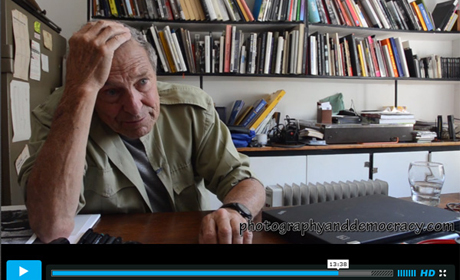
When photographer Eva-Lotta Jansson came to South Africa, she felt there was a lot she had to learn about the country's history and, in particular, the role of photography.
Jansson, who is originally from Sweden but during her life has also lived in the US and UK, moved to South Africa around seven years ago. In her first week in the country she met photographer David Goldblatt (pictured below) and was inspired to find out more about South Africa and its recent past.
Now also a guest photography lecturer, she wanted to help photography students learn "about how important photography really was in bringing about democracy here", and so she set up a website, Photography and Democracy, with this aim in mind.
"I think often times when I was teaching photography, I was trying to also explain to students how with a camera you have a lot of power as well and a lot of responsibility and I was trying to show examples of instances where photography made a real difference and I feel that in South Africa there are a lot of such instances.
"So it's to give inspiration but also to show photographers as thinkers behind images as well."

The site features interviews with a number of South African photographers in which they discuss "the photographer's work and also their personal history, as it's linked to South Africa, and their thoughts about democracy then, democracy now".
"Some of them were struggle photographers," Jansson said, "meaning they picked up a camera actually to participate politically in the struggle against apartheid and then there were others who may have just documented it".
She also interviews "a younger photographer who is no longer laden with that history when he takes his pictures".
She hopes the interviews will prove valuable for other photographer tutors too.
"Mainly I wanted other lecturers to be able to use this in a classroom setting; for example, to be able to either look at it together with students in the classroom and have some discussions around some of the ideas that come up and probably be inspired to look at what are some of the various aspects of a society you can look at with your camera."
She also hopes it will provide students with a "mentor experience".
For now the site will feature a new interview around every two weeks, she said, with a collection of interviews at the end which reflect "a fair representation of who the core South African photographers are". But she added that she also hopes "it's the beginning of a publication that can continue".
The site, which also has a Facebook page for interested users, has been supported by a grant from the Open Society Foundation for South Africa, according to Jansson.
Free daily newsletter
If you like our news and feature articles, you can sign up to receive our free daily (Mon-Fri) email newsletter (mobile friendly).
Related articles
- Daily Maverick closes down for 24 hours to protest against big tech's dominance
- Meet the inspiring, disabled journalists working their dream jobs
- Shaping the future of journalism: insights for the next generation
- New free course on war reporting launched
- Solutions journalism superstars: media mentor and trainer, Swati Sanyal Tarafdar









